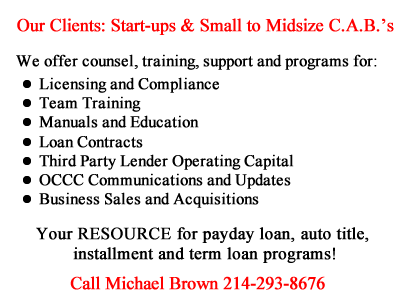Bank Fees are rising and so is use of Alternative Financial Services – coincidence?
I was reading this CNN Money.com article today: http://money.cnn.com/2012/08/13/pf/bank-fees-rise/index.html
This is an issue that I am very familiar with and the result is more customers for Texas Credit Access Businesses.
Monthly service fees on accounts with balances below $5,000 are the banks targets for the monthly service charges, which certainly fits the low and middle income profile of the typical payday consumer. And, don’t forget that NSF and Overdraft fees at many banks are have drifted up into the $35-$40 range.
Options like pre-paid debit cards are becoming more attractive compared to the bank branch, and in many cases the pre-paid cards offer more ideal online account management and smart phone capability, all with lower monthly service charges.
Consumers are learning there are more convenient and less costly options out there, and a migration towards cutting edge alternative financial services is happening. Shape your business accordingly, get creative, and stay convenient!
I refer to the information below very often in conversations – it is published by FISCA and illustrates the real deal on banking related charges versus payday advances – the APRs are less in many cases! Be sure and have these statistics ready the next time the APR topic comes up – and then nail it.
$100 Payday Loan (14 days) = $22.88 Fee (596% APR)
$100 Overdraft Protection = $29.00 Fee (756% APR)
$100 Bounced Check = $54.87 Fees (1,431% APR)
Sources:
(1) Bankrate.com, 2007 Courtesy Overdraft Study – based on average first draft
(2) Average NSF fee $28.23 (Bankrate.com, 2007 Checking Study), based on average first NSF charge, and average merchant return check fee of $26.64 (2006 CFSA fee survey).

{ 1 comment… read it below or add one }
Michael,
You made some great points in this piece. Too bad the regulators are not informed. Not only do bank NSF fees translate into higher APR’s than payday loan products but additionally, more than a few banks (Wells Fargo for example) are offering products that compete directly with payday loans. The banks debit these customers the moment their customer’s payroll check is deposited; NO RISK to the bank!